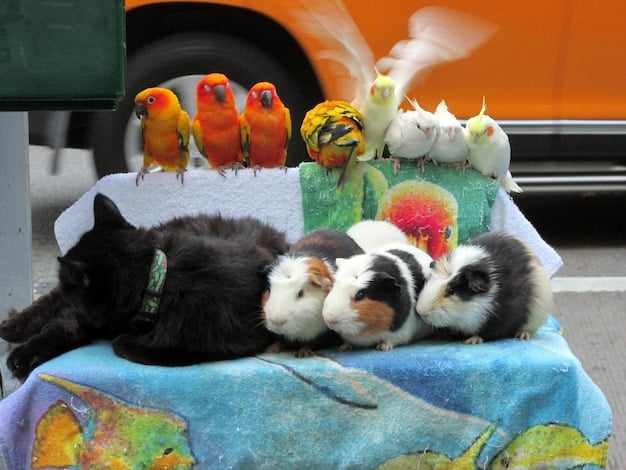Animal Welfare Act 2025: What US Pet Owners Need to Know

Anúncios
New Legislation Alert: How the Updated Federal Animal Welfare Act Impacts Pet Owners in 2025 brings significant changes to animal care standards, affecting breeders, exhibitors, and pet owners alike, with a focus on enhanced welfare and stricter regulations.
The New Legislation Alert: How the Updated Federal Animal Welfare Act Impacts Pet Owners in 2025 is set to bring substantial changes to the landscape of animal care and welfare in the United States. As a pet owner, understanding these changes is crucial to ensure you’re compliant and, more importantly, that you’re providing the best possible life for your furry, scaly, or feathered friends. Get ready to explore the key updates, their implications, and how they directly affect you and your beloved animals.
Anúncios
Understanding the Animal Welfare Act (AWA)
The Animal Welfare Act (AWA) serves as the cornerstone of animal protection legislation in the United States. It sets minimum standards of care and treatment for certain animals, and the forthcoming updates promise to strengthen these protections further. Understanding the Act’s history and purpose is vital to appreciating the scope of the upcoming changes in 2025.
A Brief History of the AWA
Initially enacted in 1966, the AWA was a response to growing concerns about the treatment of animals used in research. Over the years, it has been amended to include more animal species and to address issues such as animal fighting and transportation. The 2025 updates aim to address existing loopholes and adapt to contemporary challenges in animal welfare.
Anúncios
Core Objectives and Current Scope
The AWA aims to ensure that animals used for research, exhibition, or transported commercially receive humane care and treatment. While it has significantly improved welfare standards, it does have limitations. For instance, it excludes certain animals, such as birds, rats, and mice bred for research, and its enforcement can vary. The 2025 revisions seek to expand the scope and enhance enforcement mechanisms.
- Improving living conditions for animals in research facilities
- Regulating the transportation of animals to prevent injury and mistreatment
- Prohibiting animal fighting ventures
- Ensuring proper veterinary care for covered animals
The updated AWA in 2025 represents a significant step forward in animal welfare, addressing historical gaps and aiming for more comprehensive protection for a wider range of animals. Pet owners, breeders, and researchers all will need to stay informed to ensure compliance and promote the well-being of animals under their care.

Key Changes in the Updated Federal Animal Welfare Act for 2025
The New Legislation Alert: How the Updated Federal Animal Welfare Act Impacts Pet Owners in 2025 brings several key changes that will significantly affect pet owners. These changes range from stricter breeding regulations to improved transportation standards and increased penalties for violations. Knowing these updates is essential for compliance and ensuring your pet’s welfare.
Stricter Breeding Regulations
One of the most impactful changes in the updated AWA is the tightening of regulations for breeders. The new rules aim to prevent puppy mills and ensure all breeding facilities maintain high standards of care. This encompasses adequate housing, nutrition, veterinary care, and socialization for breeding animals and their offspring.
Enhanced Transportation Standards
The revisions also focus on improving the standards for transporting animals. This includes requirements for climate control, adequate space, and frequent rest stops during long journeys. These changes are designed to minimize stress and prevent injuries to animals during transportation, whether for commercial purposes or relocation.
- Mandatory microchipping for all commercially bred dogs
- Increased inspections of breeding facilities
- Stricter guidelines for animal shelters and rescues
- Higher penalties for AWA violations
These key changes in the updated AWA reflect a commitment to improving animal welfare across various sectors. Pet owners and stakeholders must understand these changes to comply with the new standards and contribute to better animal care practices.
How the New Regulations Affect Pet Owners Directly
The New Legislation Alert: How the Updated Federal Animal Welfare Act Impacts Pet Owners in 2025 extends beyond breeders and exhibitors, directly impacting everyday pet owners. From how you acquire your pets to the standards of care you must provide, the new regulations touch upon various aspects of pet ownership. Understanding these direct impacts is crucial for responsible pet care.
Sourcing Pets Responsibly
The updated AWA encourages pet owners to source their pets from reputable breeders or shelters. By doing so, you support ethical breeding practices and help reduce the demand for animals from substandard facilities. Responsible sourcing ensures you’re getting a healthy, well-adjusted pet.
Ensuring Adequate Care at Home
While the AWA primarily targets commercial entities, it indirectly influences the standards of care expected from pet owners. Providing adequate food, water, shelter, and veterinary care is not just a moral obligation but also a legal consideration, as neglect can result in penalties. The updated AWA reinforces the importance of responsible pet ownership.

- Choosing reputable breeders or adopting from shelters
- Providing a safe and stimulating environment
- Ensuring regular veterinary check-ups and vaccinations
- Meeting the behavioral needs of your pet
By understanding how the new regulations affect you directly, you can take proactive steps to ensure you are providing the best possible care for your pet and contributing to a more compassionate society. Responsible pet ownership is at the heart of the updated AWA.
Implications for Breeders and Animal Shelters
The New Legislation Alert: How the Updated Federal Animal Welfare Act Impacts Pet Owners in 2025 has significant implications for breeders and animal shelters. These entities must adapt to comply with the new regulations, which aim to improve animal welfare standards across the board. Understanding these implications is crucial for maintaining legal compliance and promoting ethical practices.
Adapting Breeding Practices
Breeders will need to overhaul their practices to meet the stricter standards outlined in the updated AWA. This includes providing larger and more enriched enclosures, implementing comprehensive healthcare programs, and ensuring adequate socialization for all animals. Failure to comply can result in hefty fines and the revocation of breeding licenses.
Enhancing Shelter Operations
Animal shelters must also adapt to the new regulations, particularly in terms of animal intake, care, and adoption procedures. This involves improving the quality of shelter facilities, providing behavioral enrichment, and ensuring thorough veterinary screenings. The goal is to create a more humane environment for animals awaiting adoption.
- Investing in improved housing and enrichment
- Implementing thorough veterinary care protocols
- Training staff on humane animal handling
- Enhancing adoption screening processes
The implications for breeders and animal shelters are clear: adapt to the new regulations or face the consequences. By embracing these changes, these entities can play a crucial role in improving animal welfare and promoting responsible pet ownership.
Enforcement and Penalties for Non-Compliance
The effectiveness of the New Legislation Alert: How the Updated Federal Animal Welfare Act Impacts Pet Owners in 2025 hinges on robust enforcement and meaningful penalties for non-compliance. The updated regulations include stricter oversight and increased fines to deter violations and ensure accountability. Understanding the enforcement mechanisms and potential penalties is essential for all stakeholders.
Increased Inspections and Oversight
The updated AWA calls for more frequent and thorough inspections of facilities covered by the Act. These inspections will be conducted by trained professionals and will focus on assessing compliance with the new standards. Increased oversight aims to detect and address violations promptly, preventing animal suffering.
Higher Fines and Legal Repercussions
The penalties for violating the AWA have been significantly increased under the new regulations. Violators can face substantial fines, civil penalties, and even criminal charges in severe cases. The higher stakes are intended to discourage non-compliance and emphasize the seriousness of animal welfare violations.
- Regular unannounced inspections of facilities
- Suspension or revocation of licenses for repeat offenders
- Civil penalties ranging from thousands to hundreds of thousands of dollars
- Criminal charges for egregious acts of cruelty
Enforcement and penalties are critical components of the updated AWA. They provide the teeth needed to ensure compliance and protect animals from harm. Stakeholders must take these measures seriously and prioritize animal welfare to avoid legal and ethical repercussions.
How to Stay Informed and Compliant with the AWA
Staying informed and compliant with the New Legislation Alert: How the Updated Federal Animal Welfare Act Impacts Pet Owners in 2025 requires proactive effort and continuous learning. The regulations can be complex, and it’s essential to stay updated on any changes or clarifications. Here are some practical steps you can take to ensure you remain compliant and promote animal welfare.
Follow Official Resources and Updates
The best way to stay informed is to follow official sources, such as the USDA Animal and Plant Health Inspection Service (APHIS), which is responsible for enforcing the AWA. Regularly check their website for updates, announcements, and guidance documents. Subscribing to their newsletters can also keep you in the loop.
Engage with Animal Welfare Organizations
Numerous animal welfare organizations offer valuable resources and educational programs. These organizations often provide training, workshops, and advocacy opportunities. Engaging with them can deepen your understanding of animal welfare issues and help you stay abreast of regulatory changes.
- Subscribe to USDA APHIS updates
- Join animal welfare advocacy groups
- Attend industry conferences and seminars
- Consult with legal experts specializing in animal law
Staying informed and compliant with the AWA is an ongoing process that requires dedication and effort. By leveraging available resources and engaging with the community, you can ensure you are meeting your obligations and contributing to the well-being of animals.
| Key Point | Brief Description |
|---|---|
| 🐾 Breeding Regulations | Stricter rules to prevent puppy mills and ensure higher care standards. |
| 🚚 Transportation | Improved conditions and regulations for safe animal transport over long distances. |
| 🏠 Responsible Sourcing | Encourages pet owners to source pets from reputable breeders or shelters promoting ethical practices. |
| ⚖️ Penalties | Increased fines and stricter enforcement for non-compliance with AWA standards. |
Frequently Asked Questions
▼
The primary focus is enhancing the standards of care and treatment for animals in various settings, including breeding facilities, transportation, and research, ensuring better welfare and protection.
▼
Pet owners are encouraged to source pets responsibly, ensuring adequate care at home, and being aware of the legal considerations related to neglect or mistreatment of animals.
▼
The updated AWA introduces stricter standards for breeding facilities, including improved housing, nutrition, veterinary care, and socialization for breeding animals and their offspring.
▼
Violators of the AWA can face significant fines, civil penalties, and in severe cases, criminal charges. Increased oversight and inspections aim to deter violations and ensure accountability.
▼
Breeders and shelters can stay compliant by adapting to enhance operations improve housing, implement vet protocols, train staff, and enhance adoption strategies, all in accordance with AWA.
Conclusion
The New Legislation Alert: How the Updated Federal Animal Welfare Act Impacts Pet Owners in 2025 marks a significant advancement in animal protection in the United States. By understanding the key changes, their implications, and how to stay compliant, pet owners, breeders, and shelters can contribute to a more humane and compassionate society, ensuring the well-being of animals for years to come.






